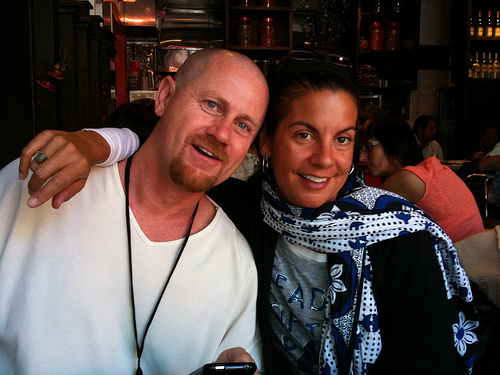What an Unspeakable Disease is not
If a friend complains of a headache, I suggest a Tylenol. If the headache is very serious, or if there is severe back pain, I prescribe my Dad’s non-opiate recipe he got from his pain doctor: Two extra-strength Tylenol capsules and two 200 mg Motrin tablets, taken at the same time. They work on different neural pathways. It has become my standby for nagging pain. But these ailments are not unspeakable diseases.
Cancer can be a little more difficult, but is certainly shareable. My sister had breast cancer and a double mastectomy in lieu of chemo and radiation. She had no difficulty sharing the news with family and friends and received lots of love and support from all. Again, there was lots of advice about diet and how cancer loves sugar and hates healthy anti-cancer salads. This was not an unspeakable disease, either. We all felt free to share advice, prayers and the latest research.
We humans are sympathetic to disease. If it is something difficult to share–perhaps terminal cancer–it is something we can discuss, perhaps with tears in our eyes. It’s very hard, but these are peripheral diseases, not ones that affect us as a person or who we are.
The Unspeakable Disease
This one hits home. I don’t know what to do–and never have. My own mother developed vascular dementia later in life as a result of congestive heart disease. She was under the opinion that everything was normal, except for the help who kept stealing her handkerchiefs, single earrings and sometimes her lipstick. She could laugh at the same jokes repeatedly , yet could still play ferocious games of competitive bridge against my mother-in-law. Only once did I ever mention the memory issue to Mom one night over dinner, and she tearfully suggested to my dad that they should leave. Fortunately, she soon forgot my indiscretion–and I never mentioned it to her again.
A company owner I know well hired a beautiful woman as office manager a few years ago. She seemed to write well, and claimed extensive knowledge of accounting software. Everything started off fine. She was organized and seemed to catch on quickly to things that needed to be done. Within a couple of months though, she seemed to forget whom she had spoken to or emailed earlier in the day. And then unusual hostility set in. The memory issue, though, was affecting day to day business.
Was it menopausal brain fog–or something more serious?
She was ultimately let go. He hired another rather older woman, past menopause, who seemed sharp and had been an accountant at her last job, where she was charged with closing the company down. She has a good sense of humor and is pleasant, but struggles with learning new tasks and completing them as well. There is a mental block of some sort, but openly discussing the root problem is really difficult.
I’m a researcher, always looking for solutions to health problems. In 2003-2005 I spent much time looking for anything that could help my mother. In those days, Aricept was the drug most advised for Alzheimers, which seemed to be a catchall term for all forms of dementia. Perhaps I was looking in all the wrong places in those days, but it wasn’t until some time after her death in early 2006 that I began to find more extensive research into memory loss and supplements that can help.
Today, I might mention that Lion’s Mane mushroom capsules, Phosphatidylserine, Huperzine or any number of other nootropics might help with memory issues and perhaps help prevent further decline. It should be as easy to mention these supplements as it would be to suggest a Tylenol.
But it’s not.
I asked my PhD physiologist husband Steve why that might be. Why can’t we openly discuss memory disorders–and suggest possible solutions as we might for other maladies? It seems headaches, cancer, sciatica and high blood pressure are all “peripheral” type disorders that don’t ultimately change our ability to think and remember. Our brain, its memory or lack of it are part of our motherboard, he said–and who we ARE. These peripheral diseases/disorders happen to us, rather than define our being.
And soon we will meet with another friend who is gallantly struggling with memory loss of some sort. I so want to pull her aside and discuss some things that might help–or we both search for a physician or clinic that might reverse or stop the progression of this horrid disease. But it’s something I can’t and probably won’t do.
Is it better I pretend nothing is wrong and just love her as she is–and perhaps be even more demonstrative? That is my instinct. But it really bothers me that this is such a difficult subject to directly broach with our afflicted family and friends. Perhaps we try to deny the mainframe breakdown as much as they and quietly pray that the deterioration will progress to further.
And perhaps, because there is no sure cure or known way to prevent dementia, it is a disease that we fear, and fear mentioning.
(Postscript: Steve briefly suggested I shouldn’t be advising supplements as I am not a physician–and then quickly recanted. We both agree that the pharmaceutical companies hold a tight rein on hospitals, the many physicians who need these hospital affiliations, the media and the rhetoric. And until the Covid debacle, I would have agreed with his initial reaction. Instead, we have both come to distrust big Pharma. Ivermectin, hydroxychloroquin and massive vitamin C infusions could have saved so many lives. Unfortunately, there is no money to be made with these common and safe solutions. Hence, I encourage all to do their own research. Regrettably, it may be difficult to share your findings with those afflicted with emerging or esconced memory issues.)







